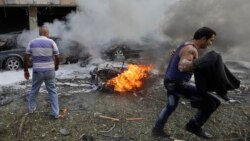Lebanese officials continue to investigate the double suicide bombings that occurred Tuesday at the Iranian embassy in Beirut –- bombings that left a tangle of bodies, blood, and burned-out cars in the street.
The twin attacks occurred in the upscale, Shiite dominated neighborhood of Bir Hassan, in the southern suburbs of the capital. At least 25 people were killed, including an Iranian diplomat, and more than one hundred and forty were wounded.
The detonation of the first bomb by an attacker who reportedly had been riding a motorcycle brought spectators to building windows, causing maximum damage when the second suicide bomber, using a car rigged with explosives, attacked less than two minutes later.
An al-Qaida-linked terrorist group, the Abdullah Brigades, claimed responsibility for the attacks, saying they would continue until the militant Shiite group Hezbollah, which is supported by the Iranian regime, withdraws its forces from Syria. Hezbollah and Iranian forces have joined the fighting in Syria to keep Iran’s ally Syrian President Bashar al-Assad in power.
In a statement, U.S. Secretary of State John Kerry strongly condemned what he called the “senseless and despicable terrorist bombings at the Iranian Embassy in Beirut. We extend our condolences to the victims and their families…[and] urge all parties to exercise calm and restraint to avoid inflaming the situation further.
“The United States,” said Mr. Kerry, “knows too well the cost of terrorism directed at our own diplomats around the world, and our hearts go out to the Iranian people after this violent and unjustifiable attack claimed the life of at least one of their diplomats.”
At a press briefing, White House spokesman Jay Carney also condemned the bombings, and said the United States supports Lebanon’s commitment to conduct a thorough investigation into the attack.
“We look to all parties to cooperate with the investigation and urge that those responsible are brought to justice,” he said. “Acts of terror only reinforce our determination to work with the institutions of the Lebanese state, including the Lebanese armed forces and the internal security forces, to ensure a stable, sovereign, and secure Lebanon.”
The twin attacks occurred in the upscale, Shiite dominated neighborhood of Bir Hassan, in the southern suburbs of the capital. At least 25 people were killed, including an Iranian diplomat, and more than one hundred and forty were wounded.
The detonation of the first bomb by an attacker who reportedly had been riding a motorcycle brought spectators to building windows, causing maximum damage when the second suicide bomber, using a car rigged with explosives, attacked less than two minutes later.
An al-Qaida-linked terrorist group, the Abdullah Brigades, claimed responsibility for the attacks, saying they would continue until the militant Shiite group Hezbollah, which is supported by the Iranian regime, withdraws its forces from Syria. Hezbollah and Iranian forces have joined the fighting in Syria to keep Iran’s ally Syrian President Bashar al-Assad in power.
In a statement, U.S. Secretary of State John Kerry strongly condemned what he called the “senseless and despicable terrorist bombings at the Iranian Embassy in Beirut. We extend our condolences to the victims and their families…[and] urge all parties to exercise calm and restraint to avoid inflaming the situation further.
“The United States,” said Mr. Kerry, “knows too well the cost of terrorism directed at our own diplomats around the world, and our hearts go out to the Iranian people after this violent and unjustifiable attack claimed the life of at least one of their diplomats.”
At a press briefing, White House spokesman Jay Carney also condemned the bombings, and said the United States supports Lebanon’s commitment to conduct a thorough investigation into the attack.
“We look to all parties to cooperate with the investigation and urge that those responsible are brought to justice,” he said. “Acts of terror only reinforce our determination to work with the institutions of the Lebanese state, including the Lebanese armed forces and the internal security forces, to ensure a stable, sovereign, and secure Lebanon.”






